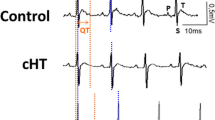Abstract
The effect of benziodarone on the levels of thyroid hormones in the serum has not attracted interest, in spite of the prolific literature on the related drug amiodarone. It is shown here that benziodarone administration has several effects, mainly similar to amiodarone, but some possibly opposite and inappropriate. Nine normal volunteers received benziodarone, 100 mg three times daily for 14 days. Before and 1, 3, 7 and 14 days after continuous administration the following estimates were obtained: serum T4, T3, rT3 and TSH, both basal (TSH0) and 30 min after iv administration of TRH (TSH30), the difference being calculated as ΔTSH. Serum T4 remained relatively constant. Serum T3 decreased significantly from the 1 st to the 14th day (eg. before 2.15 ± 0.12 nmol/l, at 3 days 1.45 ± 0.07). Serum rT3 increased significantly from the 1 st to the 14th day (eg. before 0.71 ± 0.16 nmol/l, at 7 days 2.61 ± 0.19). Serum TSH0 and TSH30 decreased significantly on the 1st and 3rd day. Later they increased, and TSH0 at 14 days was significantly higher than the pre-treatment value. Our results suggest that benziodarone has an amiodaronelike action in diverting the peripheral metabolism of T4 towards rT3 rather than T3. However, the effects on the pituitary-thyroid axis are not similar to those previously reported by others and ourselves about amiodarone, and these merit further research.
Similar content being viewed by others
References
Pritchard D.A., Singh B.N., Hurley P.J. Effects of amiodarone on thyroid function in patients with ischemic heart disease. Br. Heart J. 37: 856, 1975.
Burger A., Dinichert D., Nicod P., Jenny M., Lemarchand-Béraud T., Valotton M.B. Effect of amiodarone on serum triiodothyronine, reverse triiodothyronine, and thyrotropin. A drug influencing peripheral metabolism of thyroid hormones. J. Clin. Invest. 58: 255, 1976.
Jonckheer M.H., Plockx P., Broeckaert I., Cornette C., Beckers C. Low T3 syndrome in patients chronically treated with an iodine-containing drug, amiodarone. Clin. Endocrinol. (Oxf.) 9: 27, 1978.
Melmed S., Nademanee K., Reed A.W., Hendrickson J.A., Singh B.N., Hershman J.M. Hyperthyroxinemia with bradycardia and normal thyrotropin secretion following chronic amiodarone administration. J. Clin. Endocrinol. Metab. 53: 997, 1981.
Sogol P.B., Reed A.W., Melmed S., Pekary E.A., Hershman J.M. Amiodarone increases serum thyroid hormones and decreases hepatic 3-monodeiodination in rats. Amer. Thyr. Assoc., 57th Meeting, Minneapolis-Minnesota, Sept. 17–19/1981, p. T–30.
Sogol P.B., Hershman J.M., Reed A.W., Dillmann W.H. The effects of amiodarone on serum thyroid hormones and hepatic thyroxine 5-monodeiodination in rats. Endocrinology 113: 1464, 1983.
Nademanee K., Singh B.N., Phil D., Hedrickson J.-A., Reed A.W., Melmed S., Hershman J. Pharmacokinetic significance of serum reverse T3 levels during amiodarone treatment: a potential method for monitoring chronic drug therapy. Circulation 66: 202, 1982.
Anastasiou-Nana M., Koutras D.A., Levis G., Souvatzoglou A., Boukis M.A., Moulopoulos S.D. The correlation of serum amiodarone levels with abnormalities in the metabolism of thyroxine. J. Endocrinol. Invest. 7: 405, 1984.
Lindenmeyer M., Spoerri S., Staeubli M., Studer A., Studer H. Does amiodarone affect heart rate by inhibiting the intracellular generation of triiodothyronine from thyroxine? Br. J. Pharmacol. 82: 275, 1984.
Koutras D.A., Malamitsi J., Souvatzoglou A., Piperingos G.D., Livadas D.P., Boukis M., Papachristou D.N., Sfontouris J., Moulopoulos S.D. Relative ineffectiveness of exogenous triidothyronine as a thyroid suppressive agent. J. Endocrinol. Invest. 4: 343, 1981.
Kitsopanides J., Koutras D.A., Souvatzoglou A., Boukis M., Piperingos G.D., Sfontouris J., Moulopoulos S.D. Metabolic insufficiency as a limiting factor in the dietetic treatment of obesity. Horm. Metab. Res. 13: 477, 1981.
Nana-Anastasiou M., Levis G.M., Moulopoulos S.D. Pharmacokinetics of amiodarone following oral and intravenous administration. Int. J. Clin. Pharmacol. Biopharm. 20: 524, 1982.
Sterling J. Thyroid hormone action at the cell levels. N. Engl. J. Med. 300: 117, 1979.
Franklyn J.A., Davis J.R., Gammage M.D., Ramsden D.B., Sheppard M.C. Do diphenylhydantoin and amiodarone affect thyroid hormone action? 60th Meeting Amer. Thyr. Assoc. 19–22/9/1984, New York, Abstr. No. 40.
Camus J.P., Prier A., Kartum P. Thyréotoxicose et benziodarone. Rev. Rhum. Mal. Osteoartic. 40: 148, 1973.
Silva J.E., Larsen P.R. Pituitary nuclear-3, 5, 3′-triiodothyronine and thyrotropin secretion: an explanation for the effect of thyroxine. Science 198: 617, 1977.
Silva J.E., Larsen P.R. Contributions of plasma triiodothyronine and local thyroxine monodeiodination to triiodothyronine to nuclear triiodothyronine receptor saturation in pituitary, liver and kidney of hypothyroid rats. J. Clin. Invest. 61: 1247, 1978.
Larsen P.R., Dick T.E., Markowitz B.P., Kaplan M.M., Card T.G. Inhibition of intrapituitary thyroxine to 3, 5, 3′-triiodothyronine conversion prevents the acute suppression of thyrotropin release by thyroxine in hypothyroid rats. J. Clin. Invest. 64: 117, 1979.
Author information
Authors and Affiliations
Additional information
A preliminary version of this paper has been presented in the 9th International Thyroid Congress, 1–6 September 1985, Sao Paulo, Brazil.
Rights and permissions
About this article
Cite this article
Xanthopoulos, B., Koutras, D.A., Boukis, M.A. et al. The effect of benziodarone on the thyroid hormone levels and the pituitary-thyroid axis. J Endocrinol Invest 9, 337–339 (1986). https://doi.org/10.1007/BF03346938
Received:
Accepted:
Published:
Issue Date:
DOI: https://doi.org/10.1007/BF03346938




